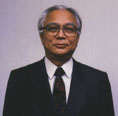Will of the People and the Role of Political Parties
Shumpei KUMON (Executive Director, GLOCOM)
 A general election is approaching. Though not yet formalized, Prime Minister Koizumi is expected to dissolve the lower house after he is renominated as the president of the ruling Liberal Democratic Party. A general election is approaching. Though not yet formalized, Prime Minister Koizumi is expected to dissolve the lower house after he is renominated as the president of the ruling Liberal Democratic Party.
On every election a question is asked. Do people vote for a candidate based on his or her personal qualities, or as a representative of a policy or a party? Then the story often goes on to a stereotype proposition that the fact that many people tend to vote on personality rather then the party of a candidate is an indication of the pre-modern mind-set of Japanese people.
However, an either-or approach in discussing a policy or a philosophy behind it, such as to choose between a market-oriented and government-controlled economy, or between capitalism and socialism, has virtually no significance today. What is important is to devise a skillful mix of policies to maximize the number of satisfied people. Indeed, most of the industrialized countries in the 20th century experienced their political parties shifting their ideologies to middle-of-the-roadism and calling themselves the people's parties, which has made it difficult to differentiate political parties based on their policies or principles. Names of the parties vividly illustrate this phenomenon. In Japan, for example, what are the differences among the Liberal Party, the Democratic Party, and the Liberal Democratic Party? And what does it mean for the Liberal Party and the Democratic Party to merge?
Another marked characteristic of the last century is the significant advance in means such as public opinion polls to find out people's desires. It is not necessary any more to go through all the trouble of carrying out a general election in which every citizen expresses an opinion. Rather, sampling from a small randomly chosen group of people would readily and obviously reflect the will of the people at large. And if democracy means a government run respecting people's wills, running a government should be relegated to a group of professionals who could realize the will of the people rather than to any political party with a distinctive underlying philosophy in promoting a policy. A system where realization of the will of the people would be auctioned among professionals, competing in method and cost to achieve the goal--to run a government--could be envisaged, which might in fact serve the people better.
If so, the Japanese way where choosing a representative is based on a personal quality rather than proposed policies could be considered a better system. Factions in each political party could be considered as separate professional groups.
There is, however, a flaw in the Japanese style of emphasizing personalities in choosing lawmakers. It is the risk of those chosen professionals to begin seeking their own interests more than that of the people, and the tendency of such a group to devise an internally 'fair' system where members would be promoted not by their abilities but by seniority. This would result in a political structure that is of, by, and for the assembly members.
This deplorable trend is not unique to Japan's political parties. It is a universal tendency of any such group of people created by human beings. Organizations are in theory established and operated with a certain social objective. By "social" I mean the seeking of well-being and benefit of other than its own members. Nevertheless, most organizations begin to neglect such original objectives and in time begin seeking the welfare of insiders. Any organization reaching that stage would have lost the very basic reason of existence, and therefore require a full-blown restructuring.
(The original Japanese article appeared in the August 18, 2003 issue of Kanagawa Shinbun)
| 




